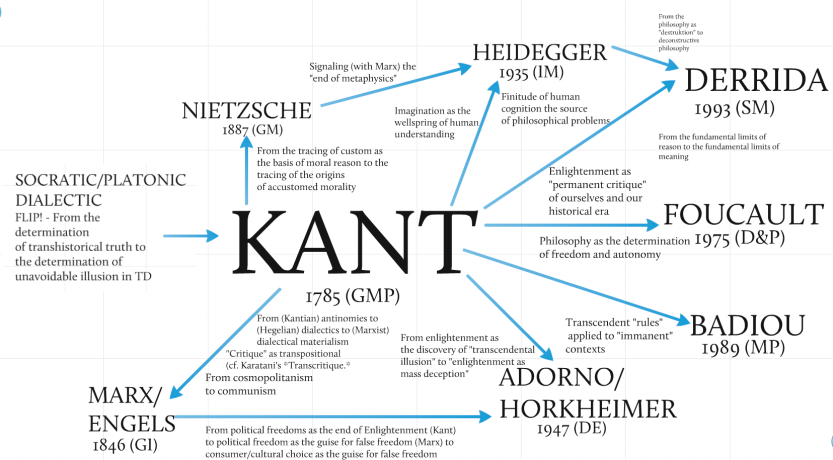
Kant’s initial project was to explicate the difference between “knowing-what” (pure reason) and “knowing-how” (practical reason) in the way of laying the foundations of a scientific metaphysics. Counter to Descartes[1] and Hume[2] he aimed at situating the subject within the limits of what can be known by rational human beings. The Kantian subject is embodied, embedded, and extended in space and time as opposed to the Cartesian subject thinking itself out of bounds in search of a God beyond the limits of sufficient reason alone, and the Humean subject as “a bundle of perceptions” according to whom all knowledge is rooted in sensory experience. Kant’s shifting conceptualization of the subject explicates the relation between the knowing mind and the acting/interacting body. The question is simply this: how does it further our understanding of the Kantian subject to situate it in particular discursive contexts?
By way of employing Leibniz’s “the principle of sufficient reason”[3] Kant introduces the question of “knowing-why” to the epistemological field. What I would like to do is to re-introduce the concept of time, or “knowing-when” into the empirical realism/critical idealism of Kant in such a way as to actualize an interstitial time where abstraction, formalisation, and visualisation take on a temporal modality of being in and through which differential individuation and inferential rationality constitute new normative judgments giving form and content to a new common-sense in accordance with a general-intellect driven by the infinity of the noumenal as a regulative idea. That’s where the thought as void consumes itself and a contraction takes place in time, giving birth to a rupture between thought and being, a modal time-space between the past and the present, out of which a progressively altered future continually emerges and change takes place. Now let us take a closer look at Kant whose attempt at reconciling critique and construction strikes us as nothing short of a ground-breaking achievement.
It also follows naturally from the concept of an appearance in general that something must correspond to it which is not in itself appearance, for appearance can be nothing for itself and outside of our kind of representation; thus, if there is not to be a constant circle, the word ‘appearance’ must already indicate a relation to something the immediate representation of which is, to be sure, sensible, but which in itself, without this constitution of our sensibility (on which the form of our intuition is grounded), must be something, i.e. an object independent of sensibility. Now from this arises the concept of a noumenon, which, however, is not at all positive and does not signify a determinate cognition of any sort of thing, but rather only the thinking of something in general, in which I abstract from all form of sensible intuition.[4]
Kant situates objectivity within the subject itself. It is at this point that the role of paradox in Kant’s system of thought emerges as a constitutive element of his conceptual/critical apparatus. The paradox is that infinitude is within finitude itself. This immanence of the objective and the universal within subjective and the particular is that which prepares the ground for Hegel to carry out the work of speculation necessary for the emergence of the rational subject as distinct from the conscious self. Kant’s great contribution to philosophy is first and foremost the split he introduces between the subject of enunciation and the enunciated content in such a way as to unite them.
In The Critique of Pure Reason, Kant explicates what he means by the principle of sufficient reason which lays the ground for the synthetic a priori as one of the core elements of Kant’s conceptual/critical apparatus.
This rule, however, for determining something in regard to temporal succession, is that the condition under which an event always (i.e., necessarily) follows is to be found in what precedes the event. Hence the principle of sufficient basis [reason] is the basis of possible experience, i.e., of objective cognition of appearances with regard to their relation in time sequence.[5]

Notes and References
[1]Dogmatic Rationalism: mind enjoys a priori cognitive access to reality, reason deduces features of reality. For Descartes correlation between thinking and being is given.
[2]Sceptical Empiricism: takes the intelligibility of sensory experience as given, reason cannot access a priori knowledge of a mind independent reality. For Hume objective correlates of sensory experience, sensations can be intelligible.
[3]The principle of sufficient reason:“The modern[1] formulation of the principle is usually attributed to Gottfried Leibniz,[2] although the idea was conceived of and utilized by various philosophers who preceded him, including Anaximander,[3] Parmenides, Archimedes,[4] Plato and Aristotle,[5] Cicero,[5] Avicenna,[6] Thomas Aquinas, and Spinoza.[7]Some philosophers have associated the principle of sufficient reason with “ex nihilo nihil fit“.[8][9] Hamilton identified the laws of inference modus ponens with the “law of Sufficient Reason, or of Reason and Consequent” and modus tollens with its contrapositive expression.[10]” More on that here
[4] Immanuel Kant, Critique of Pure Reason, trans. Paul Guyer and Alan Wood (Cambridge: Cambridge University Press, 1998), A252.
[5] Immanuel Kant, Critique of Pure Reason, trans. Paul Guyer and Alan Wood (Cambridge: Cambridge University Press, 1998), B 246.